Ancient Israel's Neighbors-1
Chris Knepp
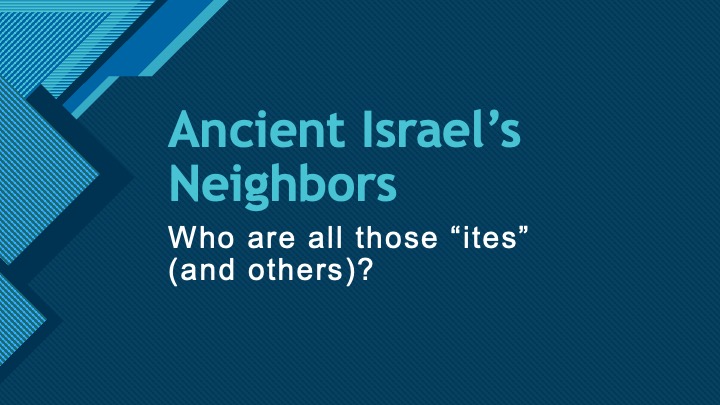
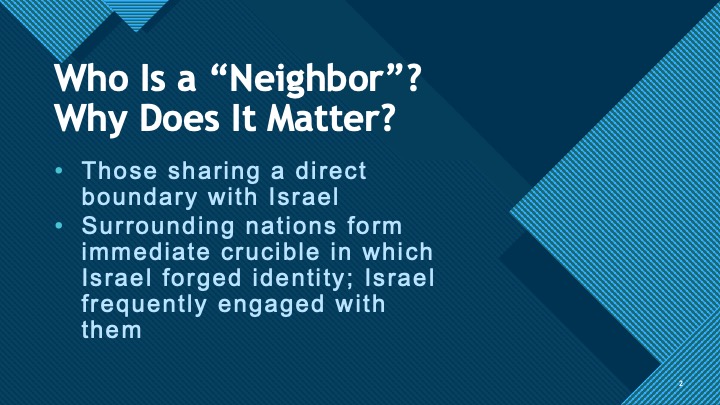
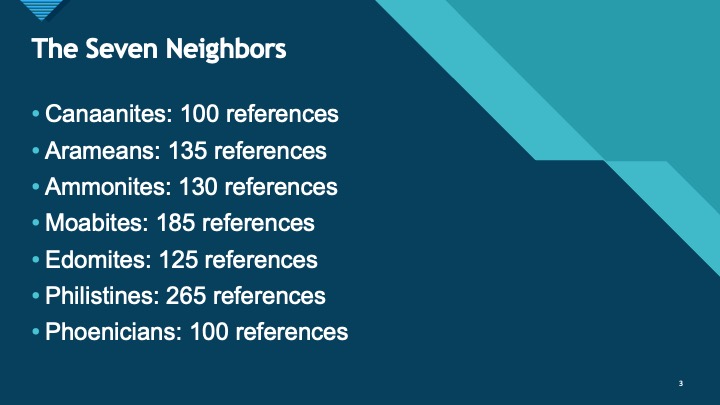
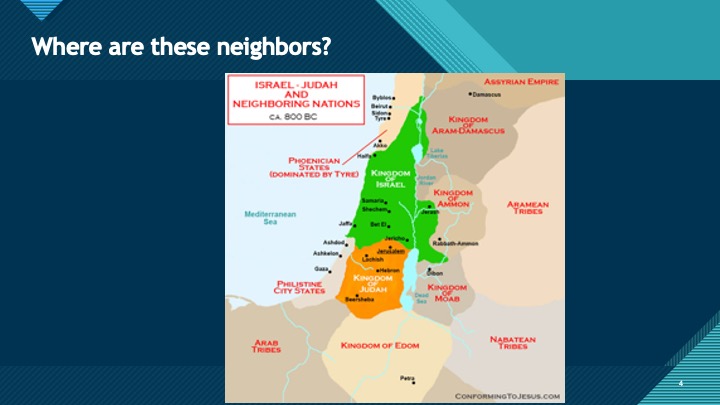
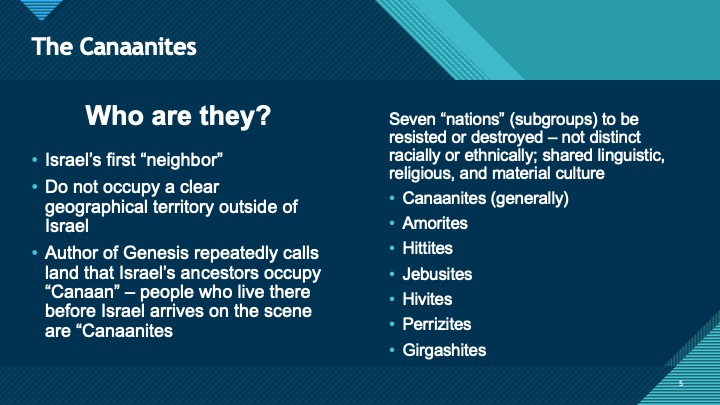
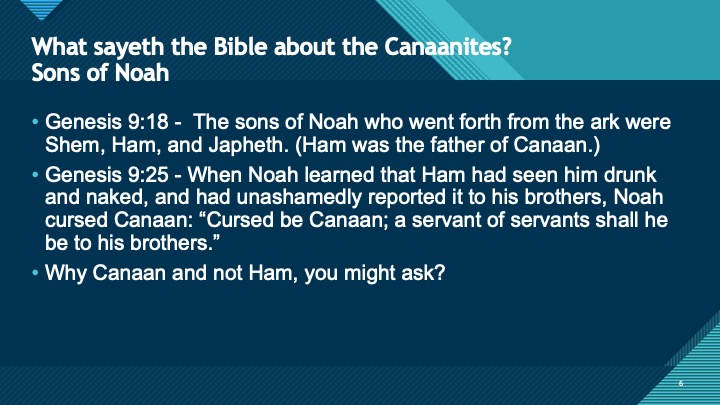
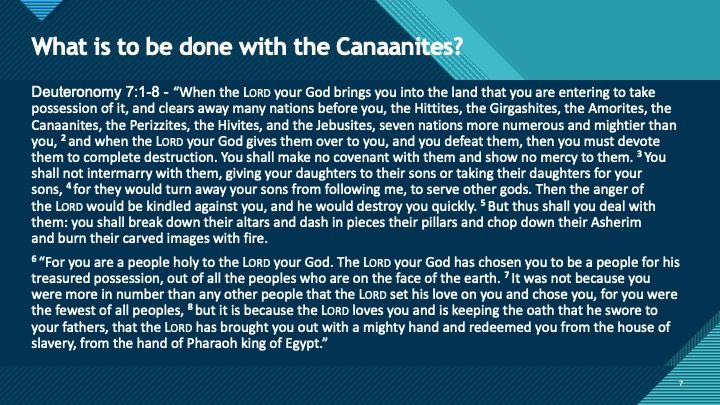
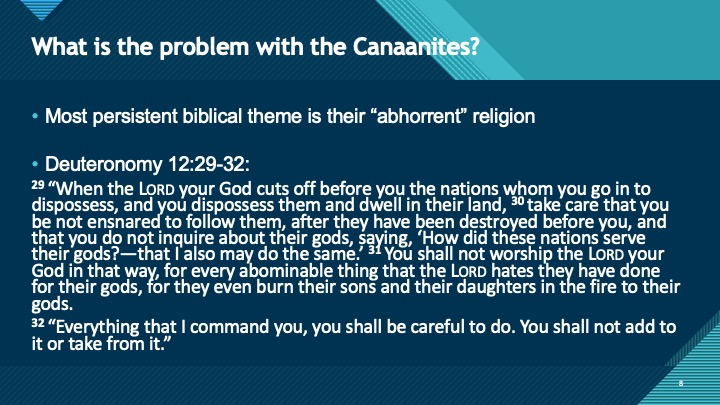
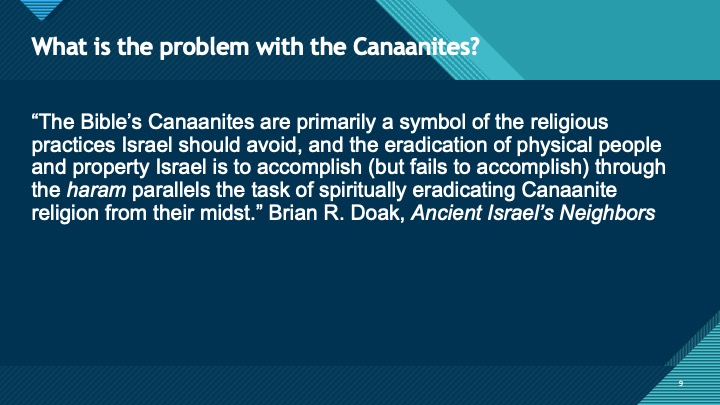
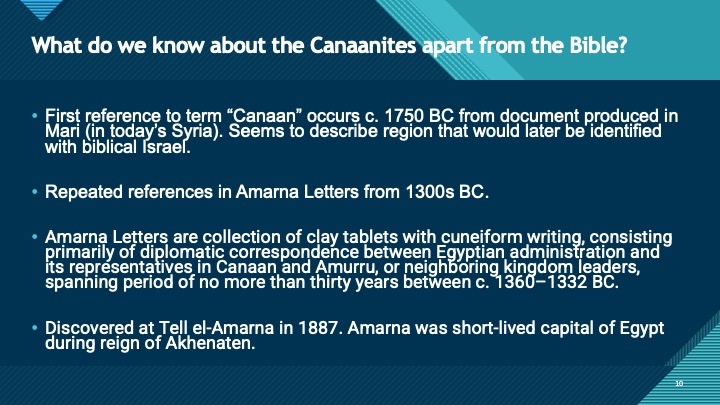
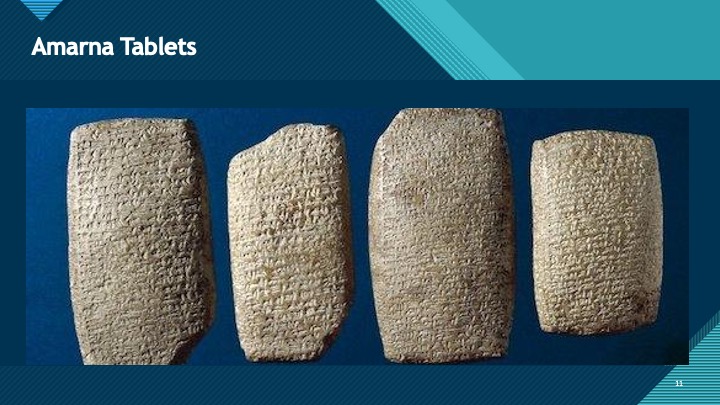
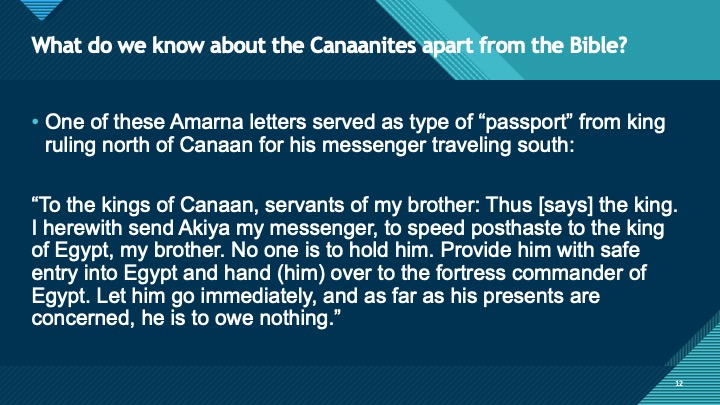
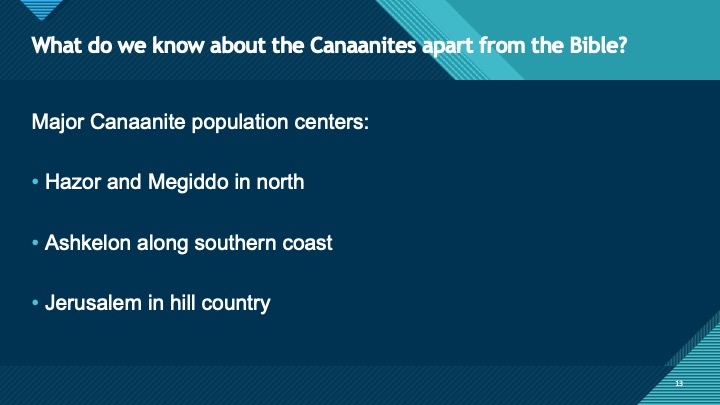
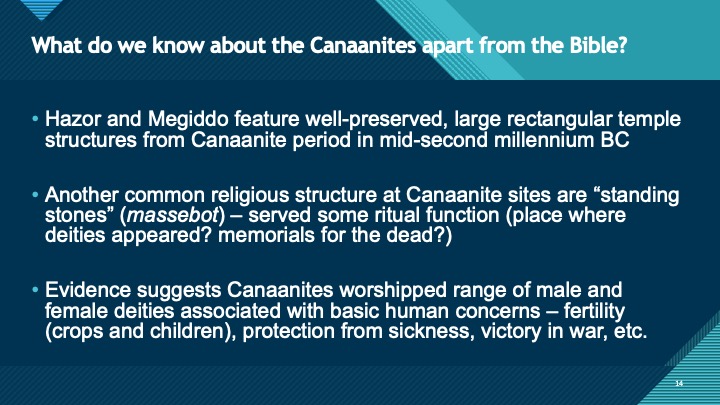
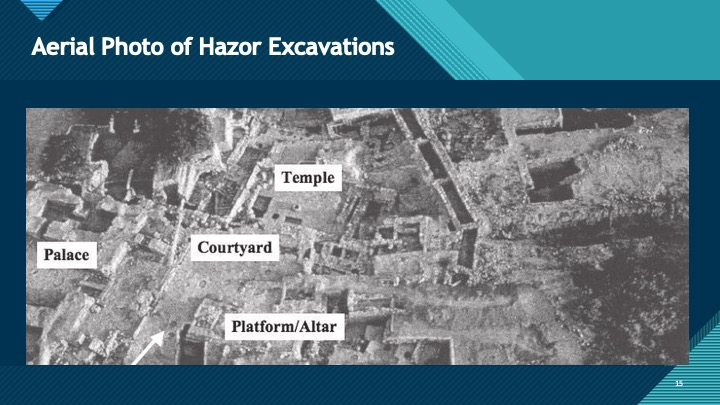
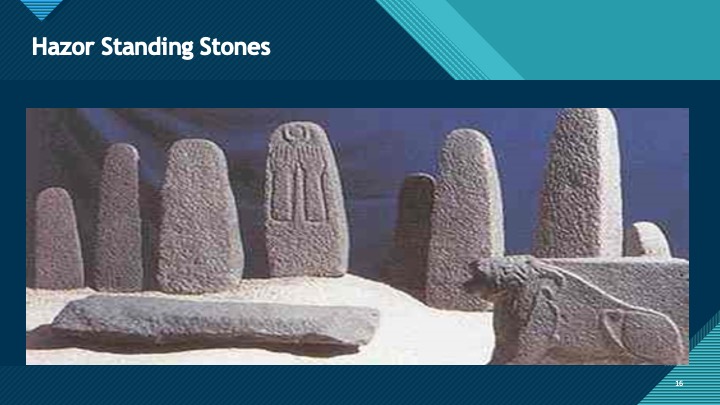
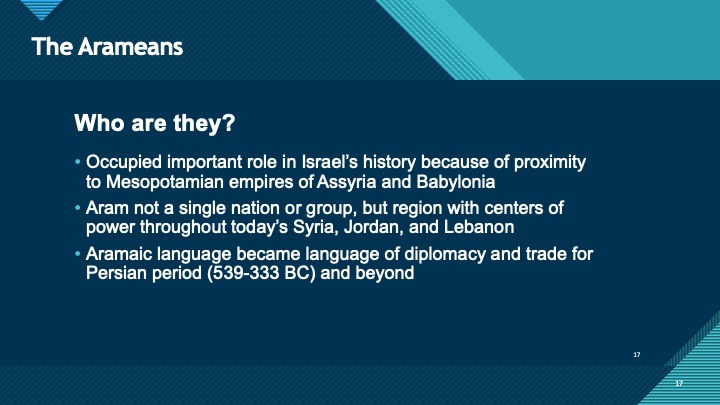
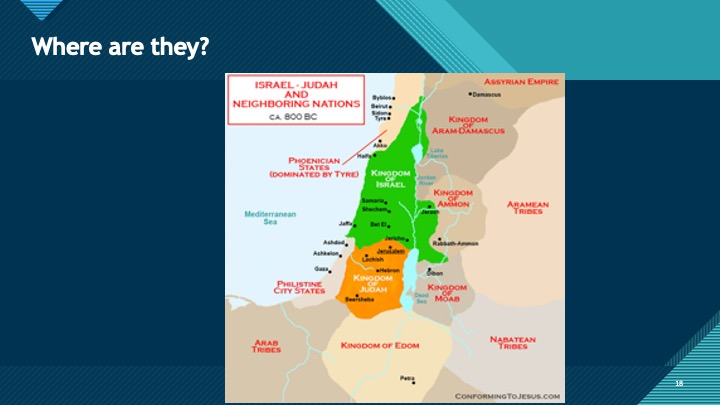
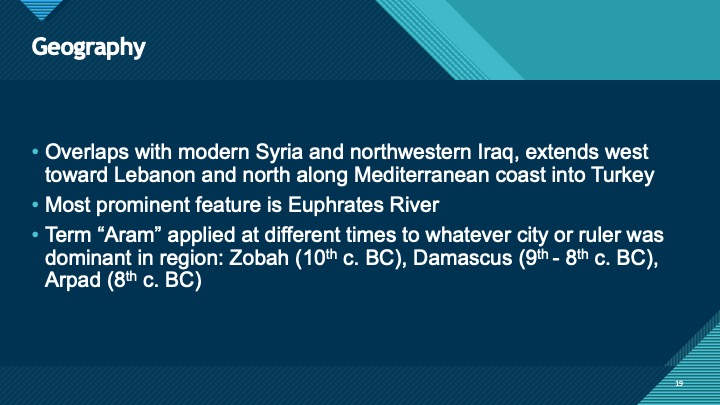
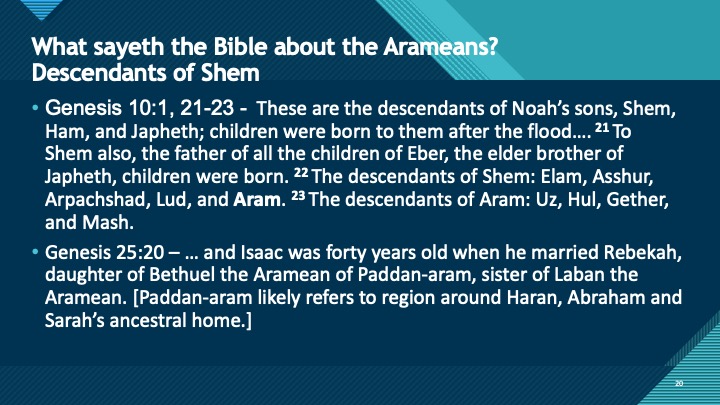
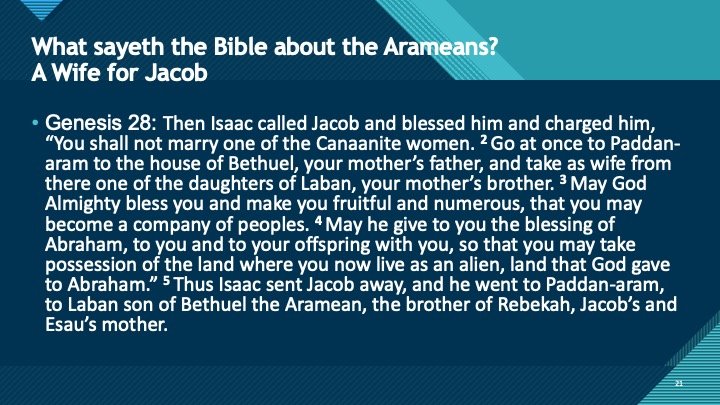
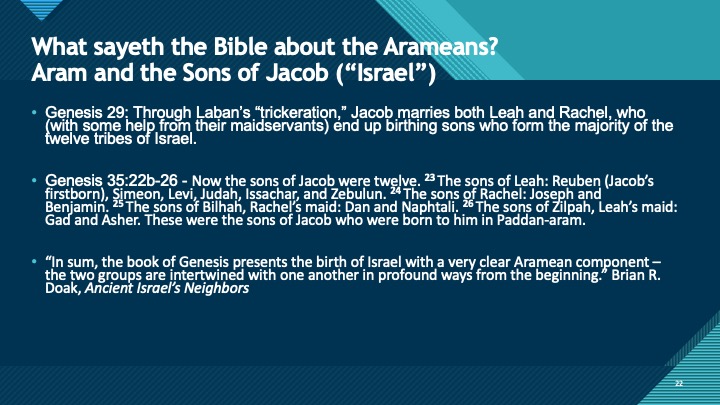
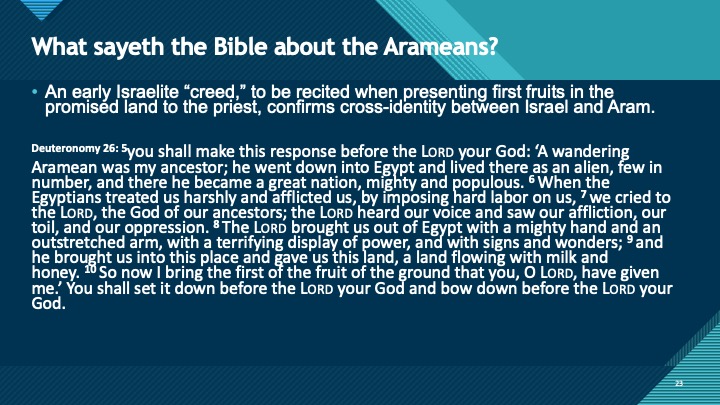
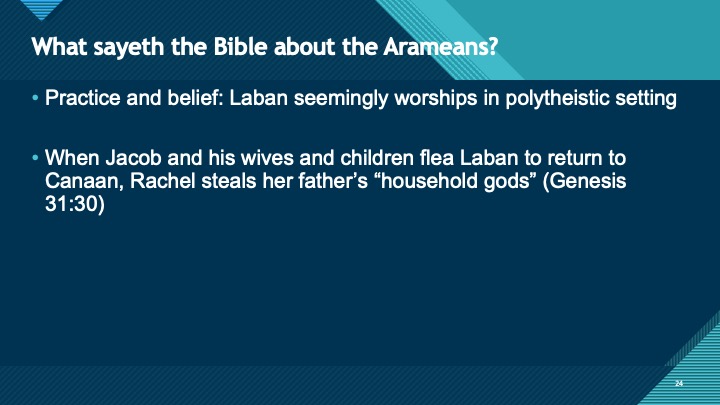
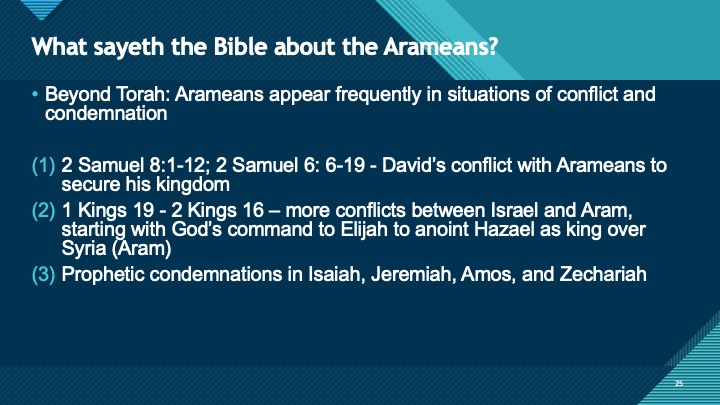
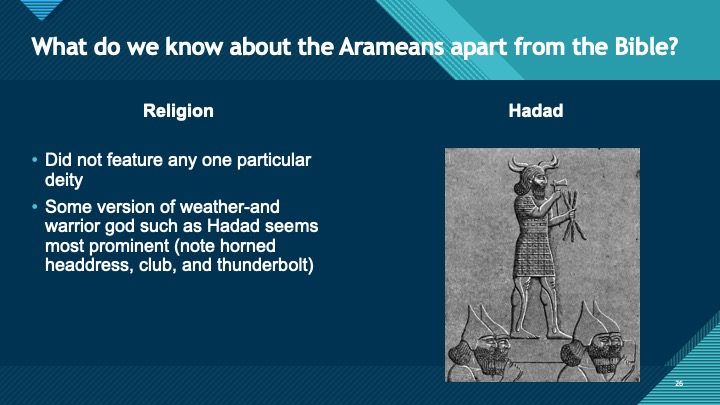
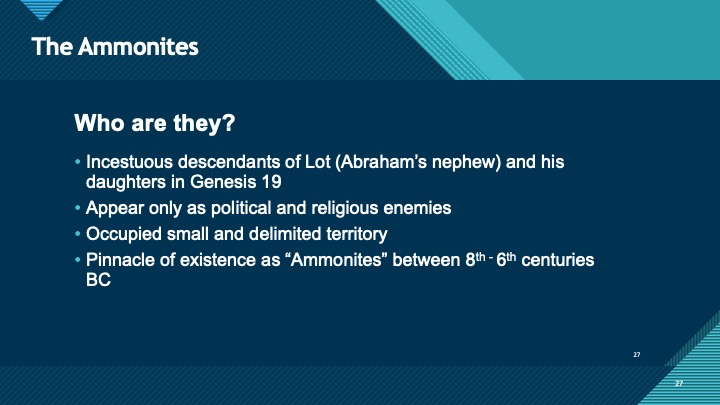
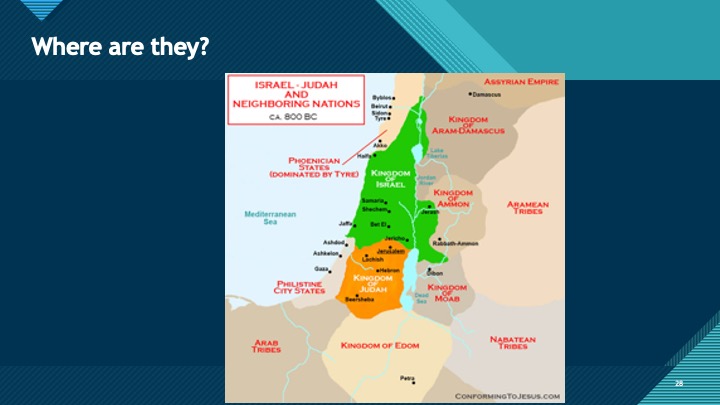
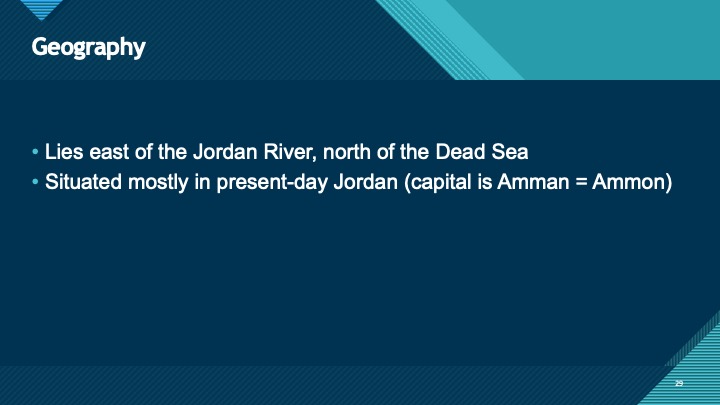
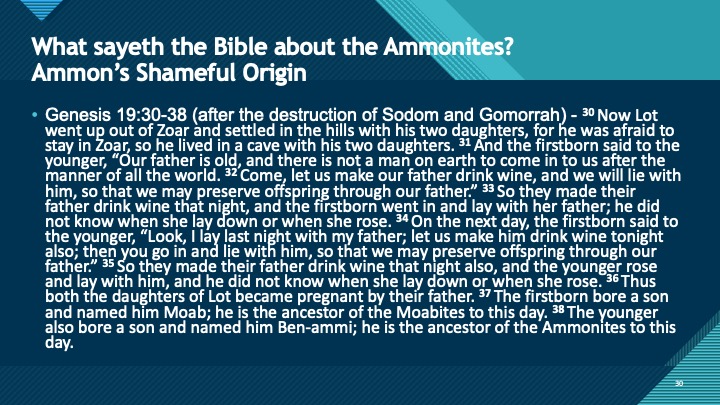
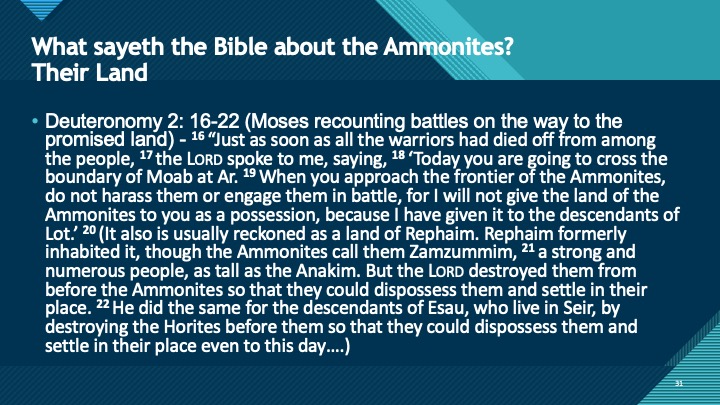
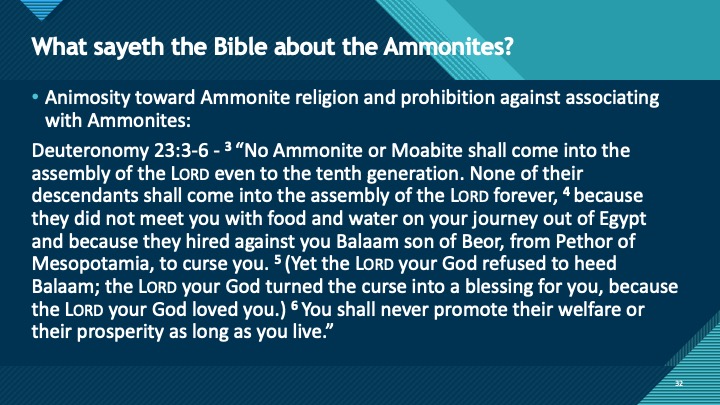
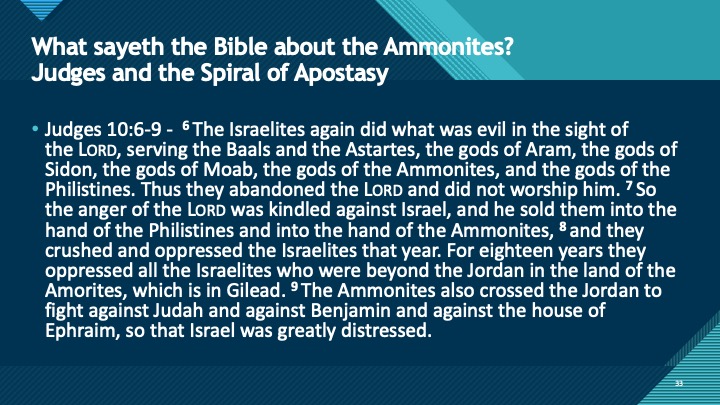
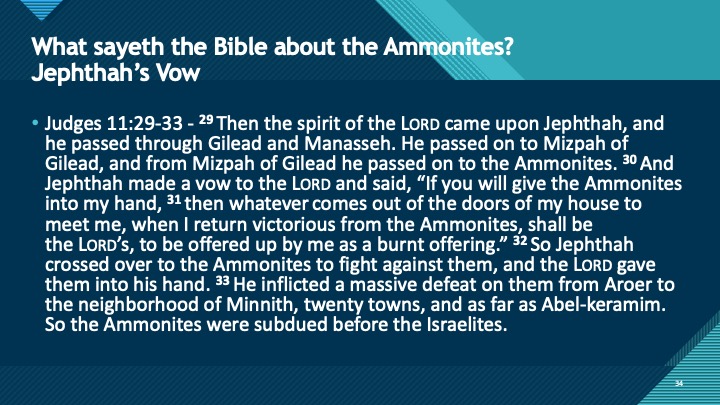
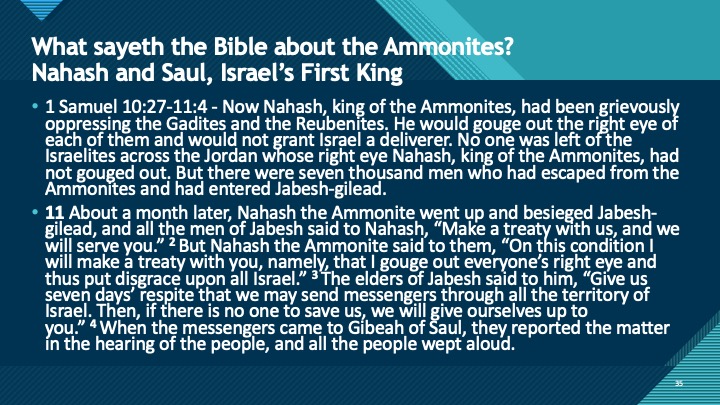
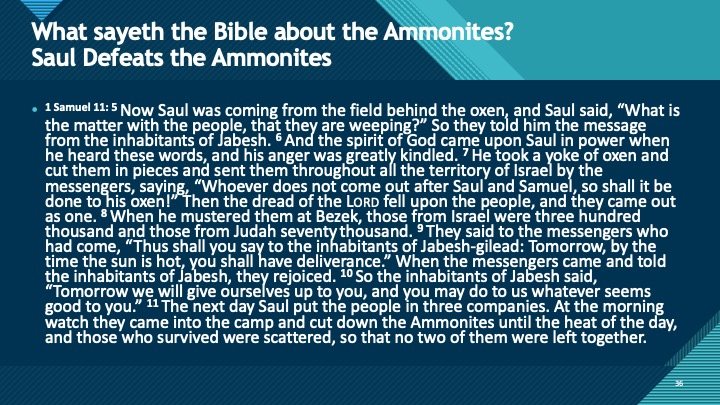
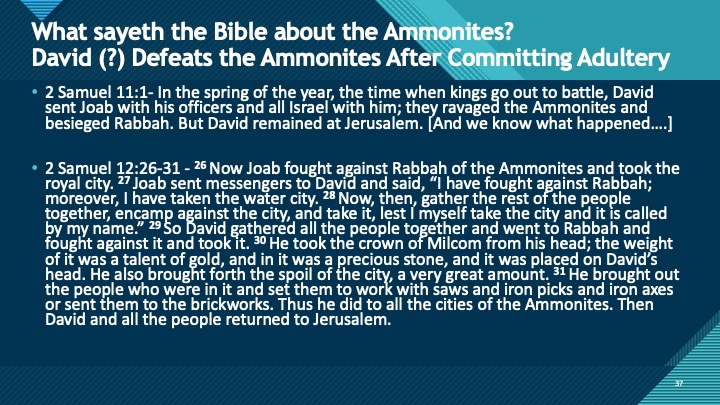
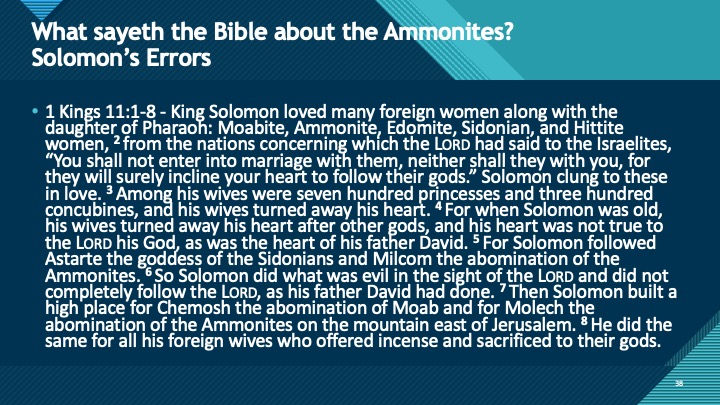
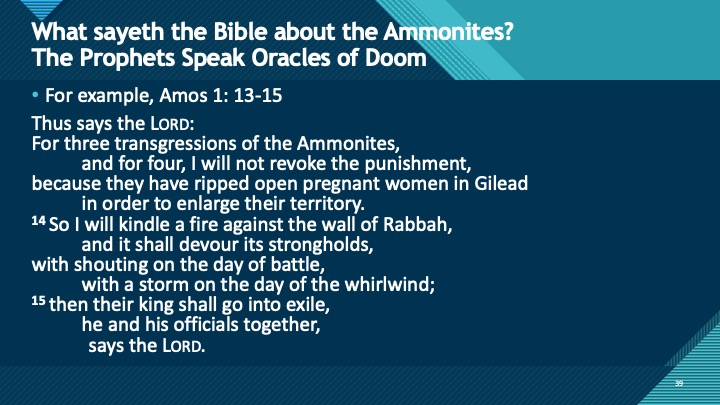
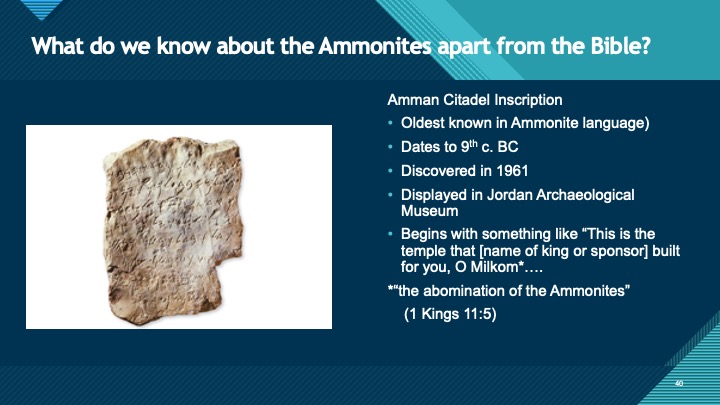
Ancient Israel's Neighbors 1 Text
Ancient Israel’s Neighbors
Who are all those “ites” (and others)?
Who Is a “Neighbor”? Why Does It Matter?
• Those sharing a direct boundary with Israel
• Surrounding nations form immediate crucible in which Israel forged identity; Israel frequently engaged with them
The Seven Neighbors
• Canaanites: 100 references
• Arameans: 135 references
• Ammonites: 130 references
• Moabites: 185 references
• Edomites: 125 references
• Philistines: 265 references
• Phoenicians: 100 references
The Canaanites
• Israel’s first “neighbor”
• Do not occupy a clear geographical territory outside of Israel
• Author of Genesis repeatedly calls land that Israel’s ancestors occupy “Canaan” – people who live there before Israel arrives on the scene are “Canaanites
Seven “nations” (subgroups) to be resisted or destroyed – not distinct racially or ethnically; shared linguistic, religious, and material culture
• Canaanites (generally)
• Amorites
• Hittites
• Jebusites
• Hivites
• Perrizites
• Girgashites
What sayeth the Bible about the Canaanites?
Sons of Noah
• Genesis 9:18 - The sons of Noah who went forth from the ark were Shem, Ham, and Japheth. (Ham was the father of Canaan.)
• Genesis 9:25 - When Noah learned that Ham had seen him drunk and naked, and had unashamedly reported it to his brothers, Noah cursed Canaan: “Cursed be Canaan; a servant of servants shall he be to his brothers.”
• Why Canaan and not Ham, you might ask?
What is to be done with the Canaanites?
Deuteronomy 7:1-8 - “When the Lord your God brings you into the land that you are entering to take possession of it, and clears away many nations before you, the Hittites, the Girgashites, the Amorites, the Canaanites, the Perizzites, the Hivites, and the Jebusites, seven nations more numerous and mightier than you, 2 and when the Lord your God gives them over to you, and you defeat them, then you must devote them to complete destruction. You shall make no covenant with them and show no mercy to them. 3 You shall not intermarry with them, giving your daughters to their sons or taking their daughters for your sons, 4 for they would turn away your sons from following me, to serve other gods. Then the anger of the Lord would be kindled against you, and he would destroy you quickly. 5 But thus shall you deal with them: you shall break down their altars and dash in pieces their pillars and chop down their Asherim and burn their carved images with fire.
6 “For you are a people holy to the Lord your God. The Lord your God has chosen you to be a people for his treasured possession, out of all the peoples who are on the face of the earth. 7 It was not because you were more in number than any other people that the Lord set his love on you and chose you, for you were the fewest of all peoples, 8 but it is because the Lord loves you and is keeping the oath that he swore to your fathers, that the Lord has brought you out with a mighty hand and redeemed you from the house of slavery, from the hand of Pharaoh king of Egypt.”
What is the problem with the Canaanites?
• Most persistent biblical theme is their “abhorrent” religion
• Deuteronomy 12:29-32:
29 “When the Lord your God cuts off before you the nations whom you go in to dispossess, and you dispossess them and dwell in their land, 30 take care that you be not ensnared to follow them, after they have been destroyed before you, and that you do not inquire about their gods, saying, ‘How did these nations serve their gods?—that I also may do the same.’ 31 You shall not worship the Lord your God in that way, for every abominable thing that the Lord hates they have done for their gods, for they even burn their sons and their daughters in the fire to their gods.
32 “Everything that I command you, you shall be careful to do. You shall not add to it or take from it.”
“The Bible’s Canaanites are primarily a symbol of the religious practices Israel should avoid, and the eradication of physical people and property Israel is to accomplish (but fails to accomplish) through the haram parallels the task of spiritually eradicating Canaanite religion from their midst.” Brian R. Doak, Ancient Israel’s Neighbors
What do we know about the Canaanites apart from the Bible?
• First reference to term “Canaan” occurs c. 1750 BC from document produced in Mari (in today’s Syria). Seems to describe region that would later be identified with biblical Israel.
• Repeated references in Amarna Letters from 1300s BC.
• Amarna Letters are collection of clay tablets with cuneiform writing, consisting primarily of diplomatic correspondence between Egyptian administration and its representatives in Canaan and Amurru, or neighboring kingdom leaders, spanning period of no more than thirty years between c. 1360–1332 BC.
• Discovered at Tell el-Amarna in 1887. Amarna was short-lived capital of Egypt during reign of Akhenaten.
• One of these Amarna letters served as type of “passport” from king ruling north of Canaan for his messenger traveling south:
“To the kings of Canaan, servants of my brother: Thus [says] the king. I herewith send Akiya my messenger, to speed posthaste to the king of Egypt, my brother. No one is to hold him. Provide him with safe entry into Egypt and hand (him) over to the fortress commander of Egypt. Let him go immediately, and as far as his presents are concerned, he is to owe nothing.”
Major Canaanite population centers:
• Hazor and Megiddo in north
• Ashkelon along southern coast
• Jerusalem in hill country
• Hazor and Megiddo feature well-preserved, large rectangular temple structures from Canaanite period in mid-second millennium BC
• Another common religious structure at Canaanite sites are “standing stones” (massebot) – served some ritual function (place where deities appeared? memorials for the dead?)
• Evidence suggests Canaanites worshipped range of male and female deities associated with basic human concerns – fertility (crops and children), protection from sickness, victory in war, etc.
Ancient Israel’s Neighbors - the Arameans
The Arameans - Who are they?
• Occupied important role in Israel’s history because of proximity to Mesopotamian empires of Assyria and Babylonia
• Aram not a single nation or group, but region with centers of power throughout today’s Syria, Jordan, and Lebanon
• Aramaic language became language of diplomacy and trade for Persian period (539-333 BC) and beyond
• Geography
• Overlaps with modern Syria and northwestern Iraq, extends west toward Lebanon and north along Mediterranean coast into Turkey
• Most prominent feature is Euphrates River
• Term “Aram” applied at different times to whatever city or ruler was dominant in region: Zobah (10th c. BC), Damascus (9th - 8th c. BC), Arpad (8th c. BC)
What sayeth the Bible about the
Arameans?
Descendants of Shem
• Genesis 10:1, 21-23 - These are the descendants of Noah’s sons, Shem, Ham, and Japheth; children were born to them after the flood…. 21 To Shem also, the father of all the children of Eber, the elder brother of Japheth, children were born. 22 The descendants of Shem: Elam, Asshur, Arpachshad, Lud, and Aram. 23 The descendants of Aram: Uz, Hul, Gether, and Mash.
• Genesis 25:20 – … and Isaac was forty years old when he married Rebekah, daughter of Bethuel the Aramean of Paddan-aram, sister of Laban the Aramean. [Paddan-aram likely refers to region around Haran, Abraham and Sarah’s ancestral home.]
What sayeth the Bible about the
Arameans?
A Wife for Jacob
• Genesis 28: Then Isaac called Jacob and blessed him and charged him, “You shall not marry one of the Canaanite women. 2 Go at once to Paddan-aram to the house of Bethuel, your mother’s father, and take as wife from there one of the daughters of Laban, your mother’s brother. 3 May God Almighty bless you and make you fruitful and numerous, that you may become a company of peoples. 4 May he give to you the blessing of Abraham, to you and to your offspring with you, so that you may take possession of the land where you now live as an alien, land that God gave to Abraham.” 5 Thus Isaac sent Jacob away, and he went to Paddan-aram, to Laban son of Bethuel the Aramean, the brother of Rebekah, Jacob’s and Esau’s mother.
What sayeth the Bible about the
Arameans?
Aram and the Sons of Jacob (“Israel”)
• Genesis 29: Through Laban’s “trickeration,” Jacob marries both Leah and Rachel, who (with some help from their maidservants) end up birthing sons who form the majority of the twelve tribes of Israel.
• Genesis 35:22b-26 - Now the sons of Jacob were twelve. 23 The sons of Leah: Reuben (Jacob’s firstborn), Simeon, Levi, Judah, Issachar, and Zebulun. 24 The sons of Rachel: Joseph and Benjamin. 25 The sons of Bilhah, Rachel’s maid: Dan and Naphtali. 26 The sons of Zilpah, Leah’s maid: Gad and Asher. These were the sons of Jacob who were born to him in Paddan-aram.
• “In sum, the book of Genesis presents the birth of Israel with a very clear Aramean component – the two groups are intertwined with one another in profound ways from the beginning.” Brian R. Doak, Ancient Israel’s Neighbors
• An early Israelite “creed,” to be recited when presenting first fruits in the promised land to the priest, confirms cross-identity between Israel and Aram.
Deuteronomy 26: 5you shall make this response before the Lord your God: ‘A wandering Aramean was my ancestor; he went down into Egypt and lived there as an alien, few in number, and there he became a great nation, mighty and populous. 6 When the Egyptians treated us harshly and afflicted us, by imposing hard labor on us, 7 we cried to the Lord, the God of our ancestors; the Lord heard our voice and saw our affliction, our toil, and our oppression. 8 The Lord brought us out of Egypt with a mighty hand and an outstretched arm, with a terrifying display of power, and with signs and wonders; 9 and he brought us into this place and gave us this land, a land flowing with milk and honey. 10 So now I bring the first of the fruit of the ground that you, O Lord, have given me.’ You shall set it down before the Lord your God and bow down before the Lord your God.
• Practice and belief: Laban seemingly worships in polytheistic setting
When Jacob and his wives and children flea Laban to return to Canaan, Rachel steals her father’s “household gods” (Genesis 31:30)
• Beyond Torah: Arameans appear frequently in situations of conflict and condemnation
(1) 2 Samuel 8:1-12; 2 Samuel 6: 6-19 - David’s conflict with Arameans to secure his kingdom
(2) 1 Kings 19 - 2 Kings 16 – more conflicts between Israel and Aram, starting with God’s command to Elijah to anoint Hazael as king over Syria (Aram)
Prophetic condemnations in Isaiah, Jeremiah, Amos, and Zechariah
What do we know about the Arameans apart from the Bible?
• Did not feature any one particular deity
• Some version of weather-and warrior god such as Hadad seems most prominent.
Ancient Israel’s Neighbors - the Ammonites
The Ammonites - Who are they?
• Incestuous descendants of Lot (Abraham’s nephew) and his daughters in Genesis 19
• Appear only as political and religious enemies
• Occupied small and delimited territory
• Pinnacle of existence as “Ammonites” between 8th - 6th centuries BC
Geography
• Lies east of the Jordan River, north of the Dead Sea
• Situated mostly in present-day Jordan (capital is Amman = Ammon)
What sayeth the Bible about the Ammonites?
Ammon’s Shameful Origin
• Genesis 19:30-38 (after the destruction of Sodom and Gomorrah) - 30 Now Lot went up out of Zoar and settled in the hills with his two daughters, for he was afraid to stay in Zoar, so he lived in a cave with his two daughters. 31 And the firstborn said to the younger, “Our father is old, and there is not a man on earth to come in to us after the manner of all the world. 32 Come, let us make our father drink wine, and we will lie with him, so that we may preserve offspring through our father.” 33 So they made their father drink wine that night, and the firstborn went in and lay with her father; he did not know when she lay down or when she rose. 34 On the next day, the firstborn said to the younger, “Look, I lay last night with my father; let us make him drink wine tonight also; then you go in and lie with him, so that we may preserve offspring through our father.” 35 So they made their father drink wine that night also, and the younger rose and lay with him, and he did not know when she lay down or when she rose. 36 Thus both the daughters of Lot became pregnant by their father. 37 The firstborn bore a son and named him Moab; he is the ancestor of the Moabites to this day. 38 The younger also bore a son and named him Ben-ammi; he is the ancestor of the Ammonites to this day.
What sayeth the Bible about the Ammonites?
Their Land
• Deuteronomy 2: 16-22 (Moses recounting battles on the way to the promised land) - 16 “Just as soon as all the warriors had died off from among the people, 17 the Lord spoke to me, saying, 18 ‘Today you are going to cross the boundary of Moab at Ar. 19 When you approach the frontier of the Ammonites, do not harass them or engage them in battle, for I will not give the land of the Ammonites to you as a possession, because I have given it to the descendants of Lot.’ 20 (It also is usually reckoned as a land of Rephaim. Rephaim formerly inhabited it, though the Ammonites call them Zamzummim, 21 a strong and numerous people, as tall as the Anakim. But the Lord destroyed them from before the Ammonites so that they could dispossess them and settle in their place. 22 He did the same for the descendants of Esau, who live in Seir, by destroying the Horites before them so that they could dispossess them and settle in their place even to this day….)
• Animosity toward Ammonite religion and prohibition against associating with Ammonites:
Deuteronomy 23:3-6 - 3 “No Ammonite or Moabite shall come into the assembly of the Lord even to the tenth generation. None of their descendants shall come into the assembly of the Lord forever, 4 because they did not meet you with food and water on your journey out of Egypt and because they hired against you Balaam son of Beor, from Pethor of Mesopotamia, to curse you. 5 (Yet the Lord your God refused to heed Balaam; the Lord your God turned the curse into a blessing for you, because the Lord your God loved you.) 6 You shall never promote their welfare or their prosperity as long as you live.”
What sayeth the Bible about the Ammonites?
Judges and the Spiral of Apostasy
• Judges 10:6-9 - 6 The Israelites again did what was evil in the sight of the Lord, serving the Baals and the Astartes, the gods of Aram, the gods of Sidon, the gods of Moab, the gods of the Ammonites, and the gods of the Philistines. Thus they abandoned the Lord and did not worship him. 7 So the anger of the Lord was kindled against Israel, and he sold them into the hand of the Philistines and into the hand of the Ammonites, 8 and they crushed and oppressed the Israelites that year. For eighteen years they oppressed all the Israelites who were beyond the Jordan in the land of the Amorites, which is in Gilead. 9 The Ammonites also crossed the Jordan to fight against Judah and against Benjamin and against the house of Ephraim, so that Israel was greatly distressed.
Jephthah’s Vow
• Judges 11:29-33 - 29 Then the spirit of the Lord came upon Jephthah, and he passed through Gilead and Manasseh. He passed on to Mizpah of Gilead, and from Mizpah of Gilead he passed on to the Ammonites. 30 And Jephthah made a vow to the Lord and said, “If you will give the Ammonites into my hand, 31 then whatever comes out of the doors of my house to meet me, when I return victorious from the Ammonites, shall be the Lord’s, to be offered up by me as a burnt offering.” 32 So Jephthah crossed over to the Ammonites to fight against them, and the Lord gave them into his hand. 33 He inflicted a massive defeat on them from Aroer to the neighborhood of Minnith, twenty towns, and as far as Abel-keramim. So the Ammonites were subdued before the Israelites.
Nahash and Saul, Israel’s First King
• 1 Samuel 10:27-11:4 - Now Nahash, king of the Ammonites, had been grievously oppressing the Gadites and the Reubenites. He would gouge out the right eye of each of them and would not grant Israel a deliverer. No one was left of the Israelites across the Jordan whose right eye Nahash, king of the Ammonites, had not gouged out. But there were seven thousand men who had escaped from the Ammonites and had entered Jabesh-gilead.
• 11 About a month later, Nahash the Ammonite went up and besieged Jabesh-gilead, and all the men of Jabesh said to Nahash, “Make a treaty with us, and we will serve you.” 2 But Nahash the Ammonite said to them, “On this condition I will make a treaty with you, namely, that I gouge out everyone’s right eye and thus put disgrace upon all Israel.” 3 The elders of Jabesh said to him, “Give us seven days’ respite that we may send messengers through all the territory of Israel. Then, if there is no one to save us, we will give ourselves up to you.” 4 When the messengers came to Gibeah of Saul, they reported the matter in the hearing of the people, and all the people wept aloud.
Saul Defeats the Ammonites
• 1 Samuel 11: 5 Now Saul was coming from the field behind the oxen, and Saul said, “What is the matter with the people, that they are weeping?” So they told him the message from the inhabitants of Jabesh. 6 And the spirit of God came upon Saul in power when he heard these words, and his anger was greatly kindled. 7 He took a yoke of oxen and cut them in pieces and sent them throughout all the territory of Israel by the messengers, saying, “Whoever does not come out after Saul and Samuel, so shall it be done to his oxen!” Then the dread of the Lord fell upon the people, and they came out as one. 8 When he mustered them at Bezek, those from Israel were three hundred thousand and those from Judah seventy thousand. 9 They said to the messengers who had come, “Thus shall you say to the inhabitants of Jabesh-gilead: Tomorrow, by the time the sun is hot, you shall have deliverance.” When the messengers came and told the inhabitants of Jabesh, they rejoiced. 10 So the inhabitants of Jabesh said, “Tomorrow we will give ourselves up to you, and you may do to us whatever seems good to you.” 11 The next day Saul put the people in three companies. At the morning watch they came into the camp and cut down the Ammonites until the heat of the day, and those who survived were scattered, so that no two of them were left together.
David (?) Defeats the Ammonites After Committing Adultery
• 2 Samuel 11:1- In the spring of the year, the time when kings go out to battle, David sent Joab with his officers and all Israel with him; they ravaged the Ammonites and besieged Rabbah. But David remained at Jerusalem. [And we know what happened….]
• 2 Samuel 12:26-31 - 26 Now Joab fought against Rabbah of the Ammonites and took the royal city. 27 Joab sent messengers to David and said, “I have fought against Rabbah; moreover, I have taken the water city. 28 Now, then, gather the rest of the people together, encamp against the city, and take it, lest I myself take the city and it is called by my name.” 29 So David gathered all the people together and went to Rabbah and fought against it and took it. 30 He took the crown of Milcom from his head; the weight of it was a talent of gold, and in it was a precious stone, and it was placed on David’s head. He also brought forth the spoil of the city, a very great amount. 31 He brought out the people who were in it and set them to work with saws and iron picks and iron axes or sent them to the brickworks. Thus he did to all the cities of the Ammonites. Then David and all the people returned to Jerusalem.
Solomon’s Errors
• 1 Kings 11:1-8 - King Solomon loved many foreign women along with the daughter of Pharaoh: Moabite, Ammonite, Edomite, Sidonian, and Hittite women, 2 from the nations concerning which the Lord had said to the Israelites, “You shall not enter into marriage with them, neither shall they with you, for they will surely incline your heart to follow their gods.” Solomon clung to these in love. 3 Among his wives were seven hundred princesses and three hundred concubines, and his wives turned away his heart. 4 For when Solomon was old, his wives turned away his heart after other gods, and his heart was not true to the Lord his God, as was the heart of his father David. 5 For Solomon followed Astarte the goddess of the Sidonians and Milcom the abomination of the Ammonites. 6 So Solomon did what was evil in the sight of the Lord and did not completely follow the Lord, as his father David had done. 7 Then Solomon built a high place for Chemosh the abomination of Moab and for Molech the abomination of the Ammonites on the mountain east of Jerusalem. 8 He did the same for all his foreign wives who offered incense and sacrificed to their gods.
Ancient Israel’s Neighbors -What Do the Prophet's Say?
The Prophets Speak Oracles of Doom
• For example, Amos 1: 13-15
Thus says the Lord:
For three transgressions of the Ammonites,
and for four, I will not revoke the punishment,
because they have ripped open pregnant women in Gilead
in order to enlarge their territory.
14 So I will kindle a fire against the wall of Rabbah,
and it shall devour its strongholds,
with shouting on the day of battle,
with a storm on the day of the whirlwind;
15 then their king shall go into exile,
he and his officials together,
says
the Lord.
What do we know about the Ammonites apart from the Bible?
Amman Citadel Inscription
• Oldest known in Ammonite language)
• Dates to 9th c. BC
• Discovered in 1961
• Displayed in Jordan Archaeological Museum
• Begins with something like “This is the temple that [name of king or sponsor] built for you, O Milkom*….
*“the abomination of the Ammonites”
(1 Kings 11:5)